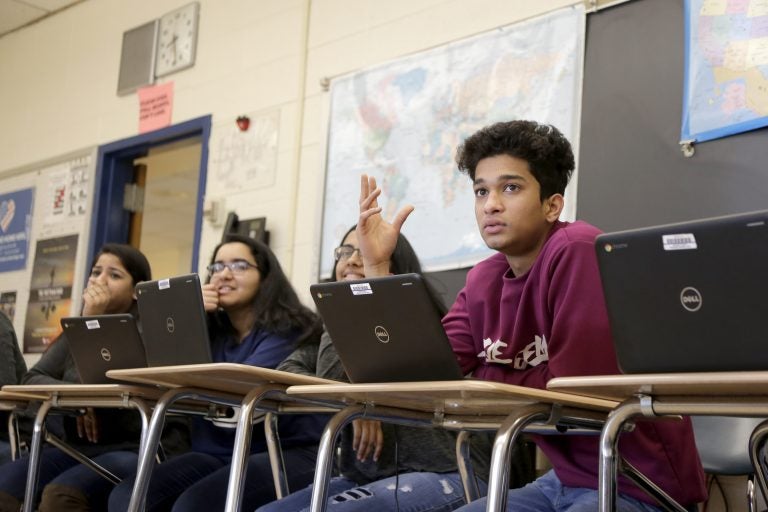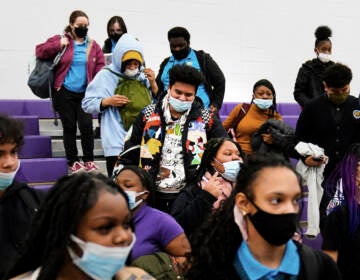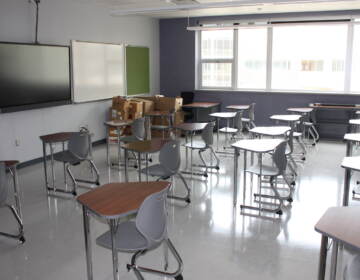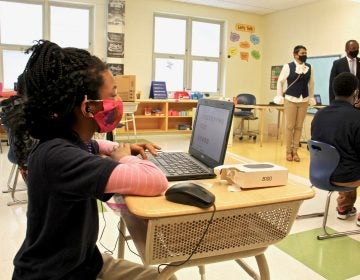N.J. coronavirus recovery: Schools to reopen in the fall; lawmakers weigh three-month budget
New Jersey schools will offer some form of in-person instruction this fall, but many students may also learn remotely, Gov. Phil Murphy announced Friday.

Students participate in an Advanced Placement government class at Hightstown High School in Hightstown, N.J., Tuesday, Feb. 19, 2019. (Seth Wenig/AP Photo)
New Jersey reported another 524 cases of coronavirus Friday, bringing the state’s cumulative total to 170,584 since the start of the pandemic.
Another 44 residents died as a result of COVID-19. The state’s confirmed and probable fatalities now stand at 14,914.
School to reopen in September with restrictions
New Jersey schools will offer some form of in-person instruction this fall, but many students may also learn remotely, Gov. Phil Murphy announced Friday.
He said the administration was releasing the guidance now to give school districts the whole summer to plan for the new academic year.
Murphy said public schools would be required to offer some form of in-person instruction, but would have wide latitude to develop plans that fit their individual needs, such as limiting class sizes or “cohorting” students in the building on different days.
“We must take into account the many geographic, demographic, and economic differences which exist among our schools and education communities, which can each vary greatly even among neighbors,” he said.
Social distancing will be required in classrooms, and faculty and staff must wear face coverings. Students will only be mandated to wear face coverings when they are unable to social distance.
Schools will have to share their plans with students and parents at least one month before the first day of the new year.
Lawmakers weigh three-month budget for extended fiscal year
New Jersey legislators are considering a three-month budget to fund state operations from July through September, after the fiscal year was extended to accommodate economic uncertainty caused by the pandemic.
The $7.7 billion state budget proposal includes some $4 billion in cuts but also tacks on additional funding for things like helping the Department of Labor improve its unemployment insurance processing system.
The Assembly Budget Committee and Senate Budget and Appropriations Committee, both led by Democrats, approved the proposal this week.
Assembly Republicans said the text of the 110-page bill was only available two hours before the vote, leaving them with insufficient time to review it.
MVC delays most in-person operations
Most in-person transactions that were slated to begin at state Motor Vehicle Commission offices later this month have been briefly delayed.
State officials announced Friday that the transactions scheduled to begin June 29 will now start July 7, as the MVC continues to test its new text notification system that will allow customers to check in remotely.
“Without the text notification system, the number of people waiting for transactions who will need to be on site will far exceed capacity limitations,” said MVC Chief Administrator Sue Fulton. “We have said that the health and safety of our customers and employees is our first priority; therefore, we cannot put people in this situation.”
Residents will have to wait until July 7 for in-person appointments to process new licenses and permits and complete registration and title transactions. Many transactions can also be completed online.
The state previously extended until July 31 most licenses, IDs, and registrations that expire after March 13.
Road testing centers and inspection stations will be open June 29.
Law caps delivery service fees on restaurants
A new state law signed by Gov. Murphy Friday limits how much third-party delivery services and apps can charge restaurants during a state of emergency related to the COVID-19 pandemic.
Officials said restaurants that were limited to delivery and takeout services only were hit with another financial punch in the high fees they paid to outside delivery companies.
“Some of these so-called service fees for food delivery are just way out of line,” said state Sen. Joe Cryan, D-Union. “It is unconscionable to take advantage of this crisis by charging [restaurants] inflated fees for delivery service. We need to support local businesses and work together to get through these hard times.”
Third-party delivery and takeout applications cannot charge a service fee greater than 20% of the cost of the order. When a restaurant employee or restaurant contractor delivers the order, the delivery app cannot charge a service fee higher than 10%.
Restaurants that had been relegated to takeout and delivery service only will be able to resume limited indoor dining options starting July 2.
WHYY is your source for fact-based, in-depth journalism and information. As a nonprofit organization, we rely on financial support from readers like you. Please give today.


![CoronavirusPandemic_1024x512[1]](https://whyy.org/wp-content/uploads/2020/03/CoronavirusPandemic_1024x5121-300x150.jpg)


